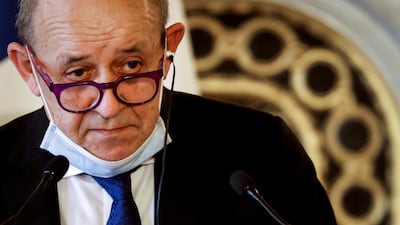The French Foreign Minister, Jean-Yves Le Drian, will meet Lebanese leaders in Beirut on Thursday, in his first official visit since France announced sanctions against Lebanon’s political class after nine months of government deadlock, sources said.
Paris has not officially announced the visit after months of French attempts to coax politicians into forming a government failed.
Mr Le Drian’s trip would be Paris’s latest push to pressure Lebanese politicians into forming a government capable of reforms necessary to unlock billions of dollars from international lenders to fix its severe economic crisis.
He is expected to meet President Michel Aoun and Parliamentary Speaker Nabih Berri, both of whom are allied to Hezbollah.
"There is no clear picture of what Mr Le Drian will propose," Alain Aoun, a member of Parliament who is part of President Aoun's Free Patriotic Movement, told The National.
"It is a last attempt to save the initiative but we don't have more information on Mr Le Drian’s visit."
It remains unclear whether prime minister-designate Saad Hariri, a key ally of France, will be meeting Mr Le Drian.
Mr Hariri's representative was unavailable for comment.
A Hezbollah spokesman said Mr Le Drian did not contact the group for a meeting.
Last week, Mr Le Drian announced that those blocking the formation of a government in Lebanon would be denied entry to France, the first punitive measure announced after months of threats. He did not disclose any names.
Imad Salamey, associate professor at the Lebanese American University, said that by doing so, France has established “something unheard of before in international affairs", as the ban is tied to internal Lebanese matters.
“Foreign interference becomes acceptable and encouraged domestically or internationally when a state has failed,” Mr Salamey said.
He said many Lebanese had welcomed the move “because they feel the political elite is careless about their destiny".
“If these threats mean anything, it’s that Lebanon has slipped into total state failure,” Mr Salamey said.
French President Emmanuel Macron launched a reform plan last September to support Lebanon after a severe financial crisis and a deadly blast at Beirut port battered the country.
As political leaders failed to agree on a Cabinet capable of enacting reforms, the French initiative collapsed, leading Mr Macron to announce in March that he will adopt a tougher approach on politicians.
Mr Salamey said that despite a shift in its approach, France is still interested in negotiating with Lebanese leaders.
“The moment they reveal the names of those who have been blacklisted, then negotiations become difficult and the prospect of achieving a political deal becomes harder,” he said.
Lebanon has been governed by a caretaker cabinet since last August, as political leaders argue over their share of the next cabinet.
Mr Hariri has accused Mr Aoun and Mr Bassil, who leads the Christian Free Patriotic Movement founded by the president, of seeking a “blocking third” of portfolios.
This amounts to a veto, which Mr Hariri refuses to cede, leading to a grinding halt.
A spokesman for Mr Bassil, who is also Mr Aoun's son-in-law, said it was unclear whether he would meet Mr Le Drian.
Lebanon’s sectarian political system has long encouraged parties to seek regional or international backers to maintain power.
Internal decision-making has long been tied to international political calculations.
The Lebanese political class is widely accused of neglect and corruption, with calls for accountability mounting after the port explosion that killed more than 200 people.
Mohanad Hage Ali, of the Carnegie Middle East Centre, said there was little interest in the French-led initiative in Lebanon “because it stipulates a lot of reforms which pose an existential threat to the political class and its interests".
Mr Hage Ali said a changing balance of power regionally would also affect the Lebanese domestic scene.
“The attention of the political class at the moment is in Vienna,'' he said, referring to talks between the US and Iran.
“The blacklisting is not effective because it presumes that the government formation is a French-led process. This is not the case.”


